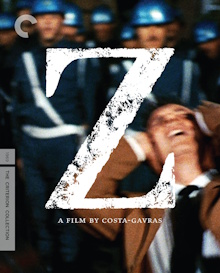Knowing nothing about Greek politics, I was apprehensive being able to understand a political film based on real-life events there. It turned out though that this is a fast-moving, readily watchable thriller that shows the assassination of an opposition leader and then more importantly covers the investigation that follows. The details shown here of a conspiracy and cover-up at the highest levels of government comes as no surprise to anyone familiar with modern politics but it’s immensely satisfying to watch them play out step by step here. What shocked me was that the investigating magistrate was allowed to get as far as he did even though the entire government is obviously in on it.
Even as the Bolshoi arrives in town for a performance in an unnamed country, activists and opposition leaders prepare for a rally featuring their party leader. Though professing themselves to be a democracy, the government puts every possible obstacle in their way, cancelling their venues, dismissing death threats against him and using thugs to attack their organizers. That night, the leader is attacked both on the way to and out of the venue. He collapses after the second attack, which involves a three-wheeled truck speeding past him. A magistrate is assigned to investigate the case which is escalated into murder when the leader dies. Though he is ostensible right-wing and works for the ruling government, he proves to be principled. Together with an enterprising photojournalist, and key witnesses, he pieces together how the government uses a nationalist right-wing organization as deniable militants to disrupt opposition events and that the murder of the leader was orchestrated by the highest ranking officers in the police and the military.
The film features a couple of major stars, notably Yves Montand as the leader and Irene Papas as his wife. But it’s really the magistrate who is the protagonist as he competently does his job. It’s incomprehensible why the government misjudged him so badly in appointing him to the role when they clearly just want someone who will sweep the case under the rug. His dispassionate demeanor as he mechanically works his way through witnesses and records the facts mirrors the procedural nature of the film. It shows how the government puts pressure on the owners of venues to prevent the opposition from holding their rally there, forces them to use a small venue, recruits deniable thugs from within an underprivileged and disaffected populace, pays demonstrators to protest and start fights and so on. All of the elements will certainly be familiar to us but the film puts everything together to show the many levers that a despotic government can pull to keep itself in power. The only quibble I have is that what is shown here seems downright mild compared to the excesses we now know about. The thugs here use clubs instead of guns and the film makes the military officers look like buffoons. This may have felt hard-edged at the time but it seems almost quaint nowadays.
It’s hard for me to tell how closely director Costa-Gavras stuck to the facts but this does seem to be very well researched and I loved how it’s packed full of small humanizing touches. The deputy may be an inspiring leader to many but the film also hints that he may be something of a womanizer and has marital troubles. His wife is similarly horrified by the attack but also apprehensive about being suddenly thrust into the spotlight. My favorite character might be the first key witness who voluntarily testifies against his friend because he’s resentful about his photograph being featured on the front page of the newspapers. He’s so upset by his friend getting all the attention that he rushes to denounce him despite his entire family trying to talk him out of it. The film also shows how poorly organized the conspiracy is and how easy it would be to unravel. So it all it took is really just one person with the authority and the determination to prosecute the case.
The film slowly builds up to justice being achieved due to the efforts of the magistrate but of course as the epilogue explains, that’s too good to be true and soon after that the military seizes power in a coup d’état. I further note that the magistrate character is based on Christos Sartzetakis who was indeed arrested and tortured by the junta. Yet he also got to become president after democracy and was very much not a liberal leader. One last note, the title refers to a protest slogan that was popular at the time that is supposed to mean “he lives”. Unfortunately the letter has been coopted by Vladimir Putin to refer to the invasion of Ukraine and it’s impossible to see it meaning anything else these days.
